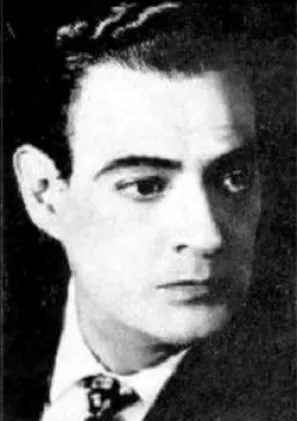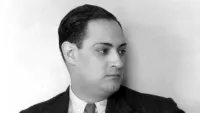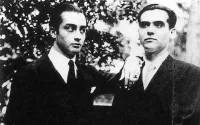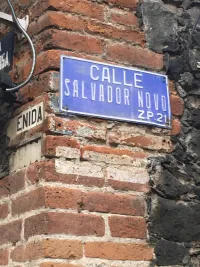Biography
1904 - 1974
“The step-by-step matching of our internal rhythms—circulation, respiration—to the deliberate universal rhythms that surround, lull, rock, yoke us, is renounced when we set off in an automobile, at an insane speed, to simply cancel out distances, change locations, swallow up miles.”
– Salvador Novo
Novo was a member of the avant-garde group Contemporáneos and began his career at an early age. Nuevo Amor (New Love, 1933) is considered one of the best collections of poetry ever written in Spanish; his play El tercer Fausto (The Third Faust, 1934) is an openly gay drama where one man, Alberto, sells his soul to the devil in order to become a woman to win the love of his life, Armando – only to learn Armando was already in love with him; and his Romance de Angelillo y Adela (Ballad of Angelillo and Adela, 1934) chronicles the love affair he had with poet Federico García Lorca. Novo’s New Mexican Grandeur (1943) was influential because of its depiction of Mexican popular culture. And his posthumously-published memoire The Pillar of Salt (1998) presents in explicit detail the underground gay life of Mexico City. Novo was a groundbreaker of Mexican radio and television and was the highest paid op-ed writer in Mexico. He was also a member of the prestigious Mexican Academy of Letters and won the National Prize for Literature in 1967. Novo was openly gay and tried to educate Mexican public opinion about the naturalness of homosexuality. Considered flamboyant and somewhat eccentric, he has been compared to Oscar Wilde, but unlike Wilde, Novo never suffered the setback of scandal or persecution and remained an accepted and respected member of society and governmental circles. In accordance with tradition, the street on which he lived was renamed after him when he assumed the role of Mexico City's official chronicler, a post he held until his death in 1974.
1904 - 1974
“The step-by-step matching of our internal rhythms—circulation, respiration—to the deliberate universal rhythms that surround, lull, rock, yoke us, is renounced when we set off in an automobile, at an insane speed, to simply cancel out distances, change locations, swallow up miles.”
– Salvador Novo
Novo was a member of the avant-garde group Contemporáneos and began his career at an early age. Nuevo Amor (New Love, 1933) is considered one of the best collections of poetry ever written in Spanish; his play El tercer Fausto (The Third Faust, 1934) is an openly gay drama where one man, Alberto, sells his soul to the devil in order to become a woman to win the love of his life, Armando – only to learn Armando was already in love with him; and his Romance de Angelillo y Adela (Ballad of Angelillo and Adela, 1934) chronicles the love affair he had with poet Federico García Lorca. Novo’s New Mexican Grandeur (1943) was influential because of its depiction of Mexican popular culture. And his posthumously-published memoire The Pillar of Salt (1998) presents in explicit detail the underground gay life of Mexico City. Novo was a groundbreaker of Mexican radio and television and was the highest paid op-ed writer in Mexico. He was also a member of the prestigious Mexican Academy of Letters and won the National Prize for Literature in 1967. Novo was openly gay and tried to educate Mexican public opinion about the naturalness of homosexuality. Considered flamboyant and somewhat eccentric, he has been compared to Oscar Wilde, but unlike Wilde, Novo never suffered the setback of scandal or persecution and remained an accepted and respected member of society and governmental circles. In accordance with tradition, the street on which he lived was renamed after him when he assumed the role of Mexico City's official chronicler, a post he held until his death in 1974.
Demography
Demography
Gender Male
Sexual Orientation Gay
Gender Identity Cisgender
Ethnicity Latinx
Nations Affiliated Mexico
Era/Epoch Interwar Period (1918-1939) Mexican Miracle (1946-1970)
Field(s) of Contribution
Author
Business
Journalism
Poet
Radio
Television
Theater
Commemorations & Honors
Mexican Academy of Letters Member
Street Where Novo Lived Named After Him
Mexico City's Official Chronicler
National Prize for Literature Recipient (1967)
Google Doodle Commemorating Salvador Novo's 110th Birthday (2014)
Demography
Gender Male
Sexual Orientation Gay
Gender Identity Cisgender
Ethnicity Latinx
Nations Affiliated Mexico
Era/Epoch Interwar Period (1918-1939) Mexican Miracle (1946-1970)
Field(s) of Contribution
Author
Business
Journalism
Poet
Radio
Television
Theater
Commemorations & Honors
Mexican Academy of Letters Member
Street Where Novo Lived Named After Him
Mexico City's Official Chronicler
National Prize for Literature Recipient (1967)
Google Doodle Commemorating Salvador Novo's 110th Birthday (2014)
Resources
Resources
Monsiváis, Carlos. Salvador Novo: The Marginal in the Center. Mexico City: Ediciones Era, 2000.
Novo, Salvador. Pillar of Salt: An Autobiography, with 19 Erotic Sonnets. 1998.
Resources
Monsiváis, Carlos. Salvador Novo: The Marginal in the Center. Mexico City: Ediciones Era, 2000.
Novo, Salvador. Pillar of Salt: An Autobiography, with 19 Erotic Sonnets. 1998.





